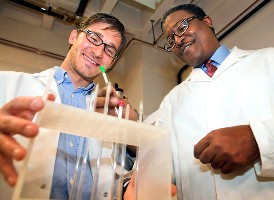As the U.S. seeks to reduce its dependence on fossil fuels, the country continues to discard large quantities of waste vegetable oil — consider the quantity of oil used to cook one order of french fries, for example — that could be converted into bio-based fuels. But this process presents problems, notably the time and toxic chemicals needed to make that conversion.
Two chemists at Brown University in Providence, Rhode Island have found a simpler, quicker, and environmentally friendly way of making this conversion happen. Postdoctoral researcher Aaron Socha and assistant professor of chemistry Jason Sello discovered a process for converting waste vegetable oil to biodiesel in a single reaction in one vessel, using environmentally friendly catalysts. Their process is also six times faster than current methods for converting waste vegetable oil to biodiesel, so it consumes less energy.
Waste vegetable oil is made up of triacylglycerols, free fatty acids, and water. The conventional way to convert waste vegetable oil into biodiesel requires two separate reactions, and the chemicals sodium hydroxide or potassium hydroxide. Not only are the chemicals toxic, they are incompatible with each other, requiring separate processes, thus the two separate and sequential reactions.
In their research, Socha and Sello found two stable and inexpensive substitute catalysts: the metals bismuth triflate and scandium triflate. Using a microwave reactor, they discovered that the new catalysts convert waste vegetable oil into biodiesel in about 20 minutes, while current reactions without catalysts using a conventional heater take two hours. The much shorter heating time more than compensates in energy consumption for the higher temperatures generated by the microwave reactor.
The findings are published in the journal Organic & Biomolecular Chemistry (paid subscription required). Awards from National Science Foundation, American Competitiveness in Chemistry, and R.B. Salomon funded the research.


 RSS - Posts
RSS - Posts
[…] Chemists Streamline Cooking Oil Conversion to Biodiesel […]